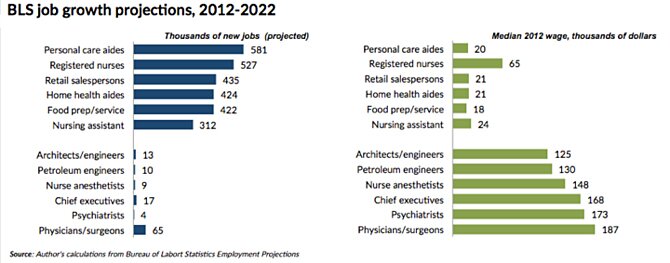An idea for the GOP to help low-income workers
|
Despite decent jobs numbers recently, many American workers are struggling. And I haven’t seen GOP candidates or pundits take on that issue squarely in months.
The last meaningful exchange I remember was between two conservative writers, Ross Douthat and Ramesh Ponnuru, who roundly critiqued GOP candidates’ economic plans after a debate back in October.
Both men worried that whoever the GOP nominates will not be able to compete against Hillary Clinton, who supports clear and concrete policies designed to support low-income working families. Ponnuru put it succinctly:
“Clinton’s program includes an increase in the minimum wage, expanded child-care subsidies, universal preschool, mandatory paid leave, and legislation to make it easier to sue employers for sex discrimination. These are policies that deliver concrete benefits to large groups of voters and signal that she is on the side of women, families, poor people, and employees.”
Well put.
But neither writer extended his critique into a concrete policy proposal for Marco Rubio or Ted Cruz or Donald Trump. I’ve got one.
Most American welfare policies (and, indeed, social policies generally) focus on self-sufficiency and getting people into jobs. But way too many jobs in America just don’t pay enough to get by.
Full-time work at the minimum wage leaves a mother with two kids 25 percent below poverty. In North Carolina, for example, more than 350,000 people are both working and living below poverty.
And the problem is destined to get worse. The Bureau of Labor Statistics regularly projects which industries the country will see the most job growth over the next decade. Between 2012 and 2022 we’ll rack up nearly three million new jobs that pay an average wage right around the poverty line for that mother of two. Over the same period, we’ll only gain about 120,000 new jobs in the highest-paying sector.
The GOP (and the Democrats) have to find a way to make work actually work. Candidates should propose doubling the Earned Income Tax Credit (EITC), a program that supplements low-income earners’ wages and enjoys broad, bi-partisan support. Doubling the EITC would go a long way to providing concrete benefits to large groups of voters.
Republicans, from the party of small government, will of course need to pay for that increased spending. A simple way to do that is to eliminate the Home Mortgage Interest Deduction (HMID). It’s a massive tax giveaway that disproportionately benefits wealthy families and doesn’t really encourage more homeownership, its stated goal. Even better, eliminating the HMID would just about pay for doubling the EITC.
That proposal would give any Republican candidate a strong position in the general election. It’s also something a lot of liberal folks could get behind.
Zach McDade, from Boulder, Colo., is a Master’s in Public Policy Candidate at Duke’s Sanford School of Public Policy. Follow Zach on Twitter (@zmcdade).
Want to stay informed on the go? Subscribe to our newsletter, This Week's 5 Gems. It's a curated digest of the week's top five stories delivered straight to your inbox.
Zach McDade
Zach McDade, from Boulder, Colo., is a Masters in Public Policy Candidate at Duke’s Sanford School of Public Policy. Follow Zach on Twitter (@zmcdade).
More Info


